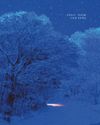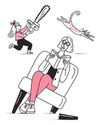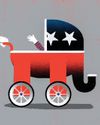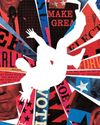
In 1968, the Malian novelist Yambo Ouologuem won France's prestigious Prix Renaudot for a bloody satire about a fictional African country called "Bound to Violence."Opening in mock epic style with the brutality of a medieval empire, and ending amid baroque assassinations in the mid-twentieth century, it vents its spleen in every direction: at slave traffickers, native and foreign; corrupt clerics and mercenary anthropologists; and, especially, oppressive rulers who used idyllic visions of the African past to hoodwink their countrymen. (Among its targets seems to have been Senegal's poet-President, Léopold Sédar Senghor, a leader of the Négritude movement and a future "immortal" of the Académie Française.) The book's biggest dupe is an African student in Paris, cultivated as the "black pearl of French culture" and then installed as the puppet leader of his nation.
Ouologuem's novel was a triumph and a scandal. Western critics hailed the arrival of a Black intellectual unafraid to tell the truth about his continent, whose "startling energy of language," John Updike wrote in this magazine, bespoke "modes of human existence prior to civilization." Many African writers accused him of cynicism or even self-hatred, though later generations would praise him for asserting literature's independence from nativism. In the midst of these debates, it emerged that "Bound to Violence" included unattributed passages from Graham Greene and André SchwarzBart, among others. Ouologuem blamed his publisher for deleting quotation marks, a claim that the publisher found absurd. He left France, disavowed his books, and became a marabout in his native Mali, where he died in 2017.
Esta historia es de la edición September 18, 2023 de The New Yorker.
Comience su prueba gratuita de Magzter GOLD de 7 días para acceder a miles de historias premium seleccionadas y a más de 9,000 revistas y periódicos.
Ya eres suscriptor ? Conectar
Esta historia es de la edición September 18, 2023 de The New Yorker.
Comience su prueba gratuita de Magzter GOLD de 7 días para acceder a miles de historias premium seleccionadas y a más de 9,000 revistas y periódicos.
Ya eres suscriptor? Conectar

YULE RULES
“Christmas Eve in Miller’s Point.”

COLLISION COURSE
In Devika Rege’ first novel, India enters a troubling new era.

NEW CHAPTER
Is the twentieth-century novel a genre unto itself?

STUCK ON YOU
Pain and pleasure at a tattoo convention.

HEAVY SNOW HAN KANG
Kyungha-ya. That was the entirety of Inseon’s message: my name.

REPRISE
Reckoning with Donald Trump's return to power.

WHAT'S YOUR PARENTING-FAILURE STYLE?
Whether you’re horrifying your teen with nauseating sex-ed analogies or watching TikToks while your toddler eats a bagel from the subway floor, face it: you’re flailing in the vast chasm of your child’s relentless needs.

COLOR INSTINCT
Jadé Fadojutimi, a British painter, sees the world through a prism.

THE FAMILY PLAN
The pro-life movement’ new playbook.

President for Sale - A survey of today's political ads.
On a mid-October Sunday not long ago sun high, wind cool-I was in Harrisburg, Pennsylvania, for a book festival, and I took a stroll. There were few people on the streets-like the population of a lot of capital cities, Harrisburg's swells on weekdays with lawyers and lobbyists and legislative staffers, and dwindles on the weekends. But, on the façades of small businesses and in the doorways of private homes, I could see evidence of political activity. Across from the sparkling Susquehanna River, there was a row of Democratic lawn signs: Malcolm Kenyatta for auditor general, Bob Casey for U.S. Senate, and, most important, in white letters atop a periwinkle not unlike that of the sky, Kamala Harris for President.